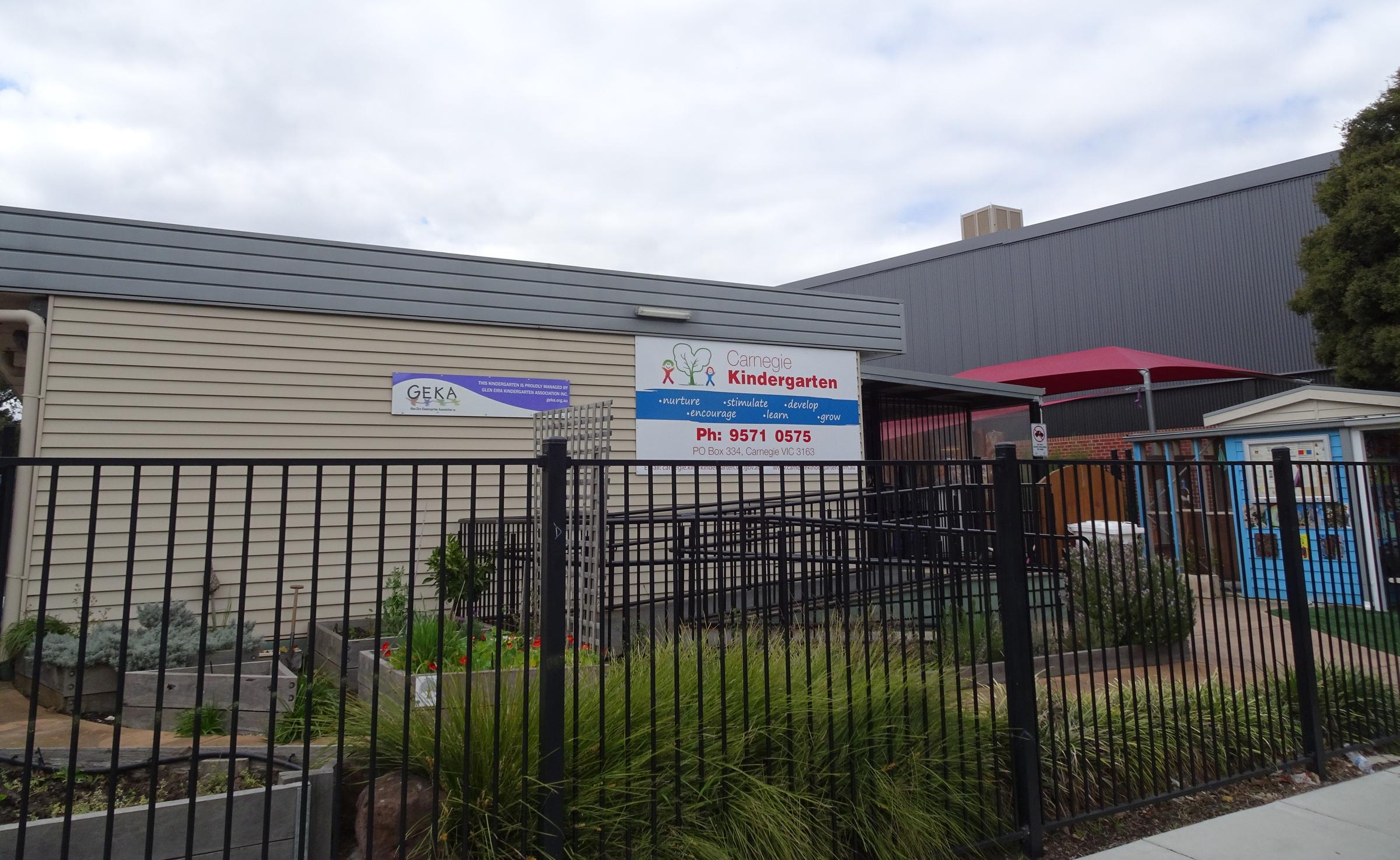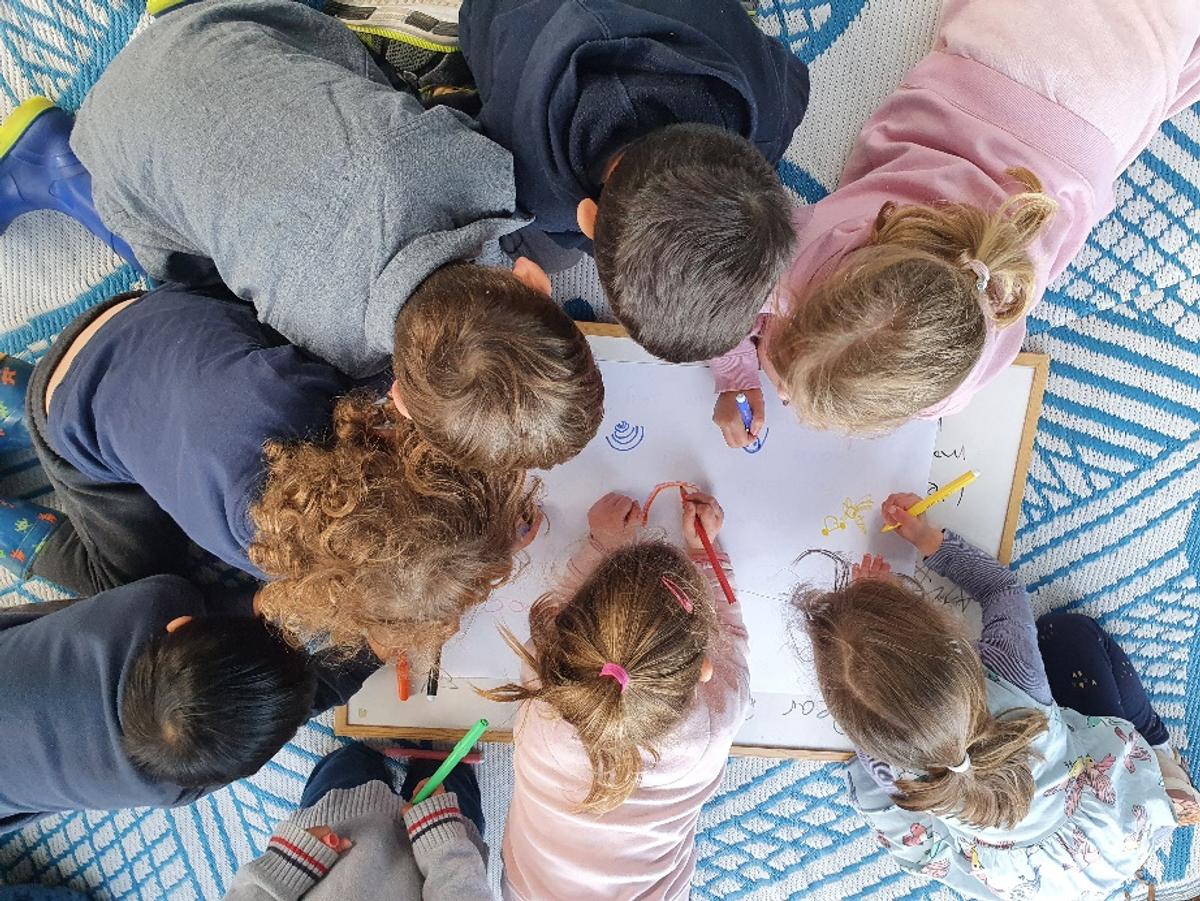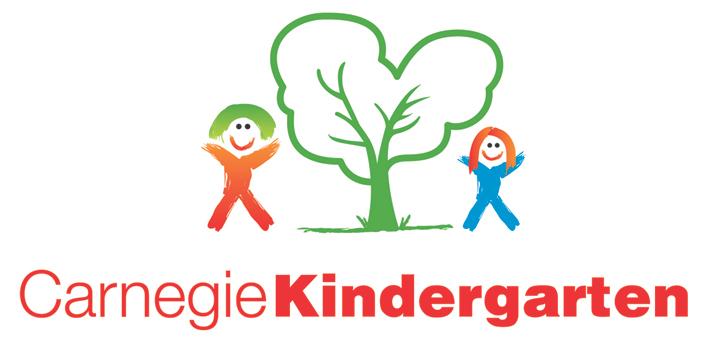GEKA Carnegie

Mindful listening in bush kinder
Ling Deng & Alisa Kums
“Healthy country, healthy people”. The natural environment plays a large role in children’s wellbeing, including helping children to develop their sense of being mindful. GEKA Carnegie Kindergarten has an amazing natural space, “bush kinder”, which offers us a special opportunity to have a mindful time with children outside.
Over the last term we have been learning about Gratitude, Empathy and Mindfulness (GEM) through The Resilience Project. In Week 6 we explored mindful listening while in bush kinder. This supported the children to strengthen their understanding of how to be mindful, how to listen actively, and develop awareness of their body and its needs.
During our group times, we discussed how last week we learnt to focus on what we could see, and this week we would practice tuning into what we could hear, as part of our mindfulness experience. We gathered in our bush kinder and sat at a spacious spot under the green trees. Using a one-minute timer, children were encouraged to focus on being still and silent, while listening to all the sounds around them during the allocated time. Educators suggested children could close or cover their eyes with their hands or choose a spot on the ground to look at to help them focus.
What a mindful time we had together! When the peaceful session ended, children were invited to reflect on what they had noticed and record their observations on large pieces of paper, in words and pictures.
Amaya:” I heard wind. I am drawing the lines like wind”
Bella: “I hear a bird on the tree"
Oliver: “I’m drawing a train, because I heard a whistle"
Madeline: “There are some students playing at school"
Shivam:” Look, this is a building site, I heard the
crane was working"
George: “It’s a flower and my friend next to me”
Noor:” I want to draw clouds"
Emily: “I want to draw a rainbow"
Matthew:” A bug in the grass"
Jet: “A plane flying in the sky"
Afterwards, we displayed the children’s observations and gave children the opportunity to continue their discussions throughout the day. “Buzzing insects, flying birds, moving leaves, driving cars on the road” … looking at their drawings, we all realised how many different sounds we could hear if we just stopped to listen.
“How did you feel about the mindful listening?” we asked the children.
Hector: “I liked mindful listening because it makes me calm down. My brain feels happy"
George: “I got a relaxation. I will tell my sister"
Daphne: “My body feels safe"
Harry: “I like to do mindfulness in bush, because I feel happy"
Nathan: “I like to listen in bush kinder, because I can enjoy something"
Olivia: “I like mindfulness. I can do a big breath and my tummy feels relaxed"
Kaden: “I’m happy to hear bush birds"
David: “I like to do mindfulness. I like to look at the birds"
Shivam: “Relaxation can give you more strength"
Ameya: “I want to do yoga in the bush, because it makes me feel good"
The teacher then explained that “sometimes we may feel excited, nervous, angry or sad. If you feel like that at kinder or at home, you can find a quiet place like bush kinder and practice listening. You can concentrate on what you see or hear, this can help you to feel mindful, to calm down or relax. Also, you can help your friends or families in this way.”
Nature is a teacher. Through The Resilience Project and nature-based practices, our team of educators are supporting children to explore different ways to be mindful. Our educators have also reflected on how mindful practices support our own teaching practices and wellbeing.
Maree - The Resilience Project has taught me to stop, take a breath to appreciate life and live in the moment. With everything going on in the world, it has shown me how to be grateful of the things I have and really appreciate them. I have learned to deal with stress, by taking five breaths to calm my mind and body - which of course has come in handy, especially having two teenage boys at home!
Supreet – I have observed learnings from The Resilience Project that have resulted in children creating a more positive existence around kindergarten, through its focus on mindfulness, gratitude and empathy.
Kavita – Regular discussions and conversations with children, making them aware of gratitude, empathy and mindfulness at this age is the best approach we can have as educators. Our children have been adapting very well, learning to relax and calm down by taking deep breaths. It has been great to see when children remind each other of the little things eg. sharing, being kind, identifying different emotions, what makes us happy? Embedding this as a continuous program in our day-to-day practice is having a positive impact on the overall environment at kinder.
Alisha – The Resilience Project has been a fantastic program and I have enjoyed seeing how children are taking on board the mindfulness techniques we have been learning. During the day I can see how children are tuning into their emotions and recognizing what they need to feel safe and supported. On a personal level, the lesson of gratitude and empathy have supported me to keep a positive mindset about the challenges this year has presented.
Aravinda - We engage in meaningful conversations with children about how we can show our gratitude to our planet by taking care of the land and ocean. The children talked about being kind to the animals, sharing land and protecting their homes by not chopping down the trees.
Ling – The Resilience Project is a great program for all of us. I like to explore the experiences of GEM with children. It not only supports children to develop their wellbeing, but also helps me to find ways to calm down and enjoy the time with my family, share in happiness and kindness with my colleagues, especially when we feel anxious in hard times.
Sudha – It was a wonderful opportunity to know and see how children feel and experience the mindfulness exercises. Sometimes, I honestly feel that we should learn from the children, who are pure at heart. Children feel secured, respected, and show positive attitude towards the world and people around them when they experience the right things at the right moment.


